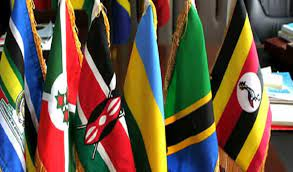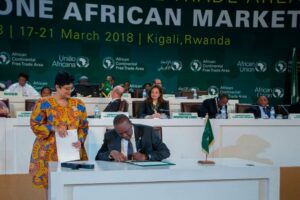
Untapped Export Potential of the East African Community in AfCFTA
East Africa is a region with immense potential for export growth. The total export value of the EAC countries varies by country and product. According to OECD data for 2021, the total export value of the EAC countries in 2021 was $25.5 billion. However much of exporting potential remains untapped. According to a recent study, the East African Community (EAC) has significant untapped export potential, particularly in the agricultural, minerals, light manufacturing, and textile sectors which are 4.355bn dollars accounting for
The East African Community (EAC) currently has an export potential of $2.5 billion under the African Continental Free Trade Area (AfCFTA). To effectively cover the AfCFTA market, the EAC needs to expand its exports by at least 46 percent. African countries came together to form the African Continental Free Trade Area (AfCFTA), a historic agreement that aims to unify the continent’s markets for products and services, encourage intra-African trade, spur economic growth, and promote integration and development.
The EAC possesses a significant untapped export potential that can be harnessed to drive economic growth and development within the framework of the African Continental Free Trade Area (AfCFTA). While the EAC has made strides in its export performance, a substantial portion of its export potential remains unrealized. To fully realize the export potential of the EAC, there is a need for concerted efforts to promote export diversification, improve trade infrastructure, and enhance competitiveness.
The Challenges of EAC
One of the key challenges facing the EAC is the concentration of exports in a few products or sectors. For instance, Burundi, Rwanda, and South Sudan have concentration indices of 55%, indicating that a significant portion of their export revenues is derived from a limited number of products or sectors. Burundi has an unrealized export potential of $55 million, with key products that could be exported to potential African markets including wheat or meslin flour, black tea, and bars & rods of iron or non-alloy steel. This makes these countries vulnerable to external shocks and market fluctuations. To reduce concentration risks and improve resilience, there is a need to promote export diversification policies that encourage the development of new products and sectors.
Another challenge facing the EAC is the lack of adequate trade infrastructure, such as ports, roads, and railways. Poor infrastructure increases trade costs, reduces competitiveness, and limits export growth. The quality of ports in the EAC varies by country, with major ports including Mombasa, Dar es Salaam, and Djibouti. Upgrades have improved capacity, but congestion and inefficiencies persist. Road and railway investments have improved transport infrastructure, but challenges remain in maintenance and quality, impacting trade flows and costs. To address this challenge, there is a need for increased investment in trade infrastructure, both at the national and regional levels. This will require collaboration between governments, development partners, and the private sector.
Enhancing competitiveness is also critical for unlocking the export potential of the EAC. This can be achieved through a range of measures, including improving the business environment, promoting innovation, and enhancing access to finance. The EAC has improved its business environment, promoted innovation, and enhanced access to finance. Reforms like one-stop border posts, online business registration, and risk-based inspection systems have improved ease of doing business. Technological innovations and patent rights protection contribute to export competitiveness. However, the abuse of digital rights and the observed digital divide make for poor exploitation of the potential, and a good number of people are excluded. Governments can also support export-oriented industries through targeted policies, such as export promotion schemes and investment incentives.
The EAC must take advantage of the AfCFTA, to expand its export markets and increase its share of global trade. The AfCFTA provides a platform for African countries to trade with each other on preferential terms, creating new opportunities for export growth. To fully benefit from the AfCFTA, the EAC must address the challenges of trade facilitation, rules of origin, and non-tariff barriers.
The untapped export potential of the EAC presents a significant opportunity for economic growth and development. By promoting export diversification, improving trade infrastructure, enhancing competitiveness, and leveraging initiatives like the AfCFTA, the EAC can unlock its full export potential and position itself as a major player in international trade. This will not only benefit the member states of the EAC but also contribute to global trade and prosperity. It is time for the EAC to seize this opportunity and unleash its untapped export potential.
The EAC must benefit from the AfCFTA in order to widen its export markets and raise its proportion in world commerce. The AfCFTA offers a platform for preferential trade between African nations, opening up fresh possibilities for export expansion. The EAC must address the issues with trade facilitation, rules of origin, and non-tariff obstacles in order to fully benefit from the AfCFTA. The EAC’s unrealized export potential offers a huge window of opportunity for economic expansion and development. It is crucial to increase competitiveness, which may be done by taking actions like fostering innovation, enhancing access to capital, and strengthening the business environment. Governments can aid industries that focus on exports by implementing certain policies.
To fully benefit from the AfCFTA, the EAC must address trade facilitation, rules of origin, and non-tariff barriers. The EAC may increase its export potential by diversifying its economy, advancing regional integration, creating institutions to encourage trade, and addressing issues with revenue. This offers a huge chance for economic growth and development, which will not only benefit the EAC member nations but will also advance commerce and prosperity on a global scale. The EAC can realize all of its export potentials and establish itself as a significant player in world trade. This will increase trade and wealth around the world in addition to helping the EAC member states. The EAC needs to take advantage of this chance and unleash its unrealized export potential.
These are the writer’s own opinions and do not necessarily reflect the viewpoints of Liberty Sparks. Do you want to publish in this space? Contact our editors at info@libertysparks.org for further clarification.



